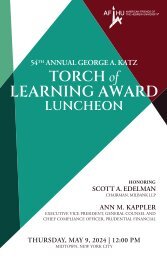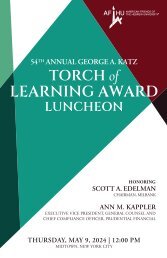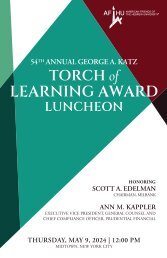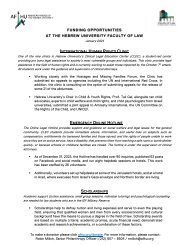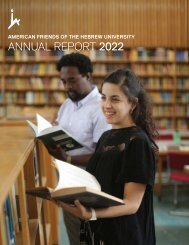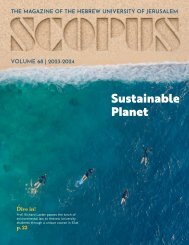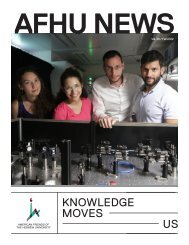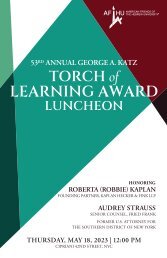SCOPUS
Create successful ePaper yourself
Turn your PDF publications into a flip-book with our unique Google optimized e-Paper software.
Roundtable<br />
The Impact Revolution<br />
Impact Investments and<br />
Social Entrepreneurship<br />
A Roundtable Discussion with Leading Hebrew University Alumni<br />
In early Fall 2020, the Hebrew University’s Division for Advancement and External Relations and the Hebrew<br />
University Alumni Association organized a roundtable discussion on impact investing, which equally emphasizes<br />
capital returns and positive social or environmental impact. The panel hosted prominent Hebrew University<br />
alumni for a discussion on what drives them as impact investors and to share success stories, challenges, and<br />
opportunities.<br />
The panel featured Cecile Blilious, Head of Impact & Sustainability, Pitango Venture Capital; Yoel Cheshin,<br />
Chairman & Founder, 2B Group; Sandrine Montsma, Managing Partner, Bridges Israel, Yaron Neudorfer, CEO,<br />
Social Finance Israel.<br />
Moderator: Dr. Dan Marom, Faculty member at the Hebrew University’s Jerusalem School of Business<br />
Administration and Head of the Impact Investing Institute.<br />
Photo by Yoram Reshef<br />
(SFI), the first social investment house in Israel. I also<br />
chair the Israeli National Advisory Board on Impact<br />
Investment, which brings together major players to<br />
advance the impact movement.<br />
Cheshin: I was teaching philosophy and law, and my<br />
brother was in finance. I’d always wanted to go into<br />
business with him, but he refused. When he was<br />
tragically killed in a car accident, I founded the 2B<br />
Group, which stands for two brothers. I started with<br />
2B-Angels, a high-tech venture fund. I also wanted<br />
to get more money to philanthropic causes without<br />
relying on the goodwill of donors – NGOs that protect<br />
basic human rights shouldn’t have to beg for money.<br />
So I founded 2B-Community. I still saw business<br />
on a sliding scale, based on the degree of success. We<br />
recently launched Israel’s first municipal social impact<br />
bond to help isolated seniors during the Coronavirus<br />
lockdown in Tel Aviv. Visiting volunteers will create<br />
the capacity for seniors to access municipal services<br />
and teach them to use technology to communicate.<br />
We will measure this program’s immediate and longterm<br />
impact on the seniors’ lives.<br />
Cheshin: My example is Centrical, which is part<br />
of 2B-Angel’s portfolio. It’s a company that uses<br />
gamification to enhance the performance of corporate<br />
salespeople. You might ask: Sales? Corporations?<br />
Impact? The company believes in helping employees<br />
become the best they can –employees are at the center.<br />
Cecile Blilious Yoel Cheshin Sandrine Montsma Yaron Neudorfer Dr. Dan Marom<br />
Photo by Ilya Melnikov<br />
Photo by Genius 100 Foundation<br />
Marom: I see impact investing as the alignment of<br />
capital with values, and I hope that our conversation<br />
will inspire members of our audience to become<br />
impact investors. Could you share your personal<br />
journey to impact investing?<br />
Blilious: In the early 2000s I was managing the<br />
Noaber Foundation’s Israeli investments, thinking<br />
about ways to bring together values, capital, and tech.<br />
A decade later, I founded Impact First Investments,<br />
Israel’s first impact investing company. Today I am at<br />
Pitango, Israel’s largest venture capital fund, where I<br />
incorporate impact investing into general venture<br />
capital. This is the future – scaling impact investing<br />
through mainstream investments.<br />
Montsma: Until recently, my career had been in<br />
private sector management. In 2016 an acquaintance,<br />
who is now my business partner, called and asked if<br />
I’d heard about impact investing. I hadn’t. He sent<br />
me some information and asked me to meet with<br />
Sir Ronald Cohen [a pioneer in impact investing –<br />
Scopus] in London the following week. Sir Ronald<br />
Cohen spoke to my deepest values and common sense.<br />
I kept thinking, “Of course! That’s where I want to be!”<br />
In 2018 I co-founded Bridges Israel, which invests<br />
in Israeli companies that serve the socio-economic<br />
periphery and in Israeli technology companies that<br />
generate global impact. Bridges Israel is both a private<br />
equity and a venture capital fund, and has made 10<br />
investments to date.<br />
Neudorfer: Unlike Sandrine, I was in the public and<br />
third sectors. I worked for the Ministry of Finance and<br />
then served as the Chief Financial Officer at the Jewish<br />
Agency. I realized we were dealing with a new type of<br />
donor. They don’t just write a check – they think like<br />
investors. They want to see what their marginal dollar<br />
is doing for the beneficiary. In 2012 Sir Ronald Cohen<br />
recruited me to serve as CEO of Social Finance Israel<br />
and philanthropy as separate. But when I became a<br />
member of Toniic’s 100% Network, pledging all of<br />
my own capital to net positive impact, I went back<br />
and looked at 2B-Angel’s portfolio and realized that<br />
although I’d invested in them as regular businesses,<br />
most of them, from my point of view, were impact<br />
investments. It’s a matter of spirit.<br />
Marom: I find that the best way to inspire people,<br />
to bridge the gap between intention and action, is<br />
to focus on a specific example. What project are you<br />
most proud of?<br />
Neudorfer: I have a recent example – from social<br />
services. Currently, national or local governments issue<br />
tenders, distribute funds, and hope it all works out. SFI<br />
does things differently: the social impact bond, or the<br />
“pay for success” model. Investors fund projects that<br />
have specific, pre-defined criteria for success. If met,<br />
the government returns the investment with interest<br />
The company’s services enable employers to invest in<br />
the employees’ performance, help them learn and<br />
engage, and prevent alienation. Any business that has<br />
human-centric goals, or has a conscience, is, in my<br />
mind, impact.<br />
Blilious: My example is from tech: Via, an Israeli<br />
ride-sharing company that creates affordable and<br />
accessible public mobility solutions around the globe.<br />
They enable people without access to cars or regular<br />
transit to reach jobs, healthcare, education, and more.<br />
Via offers a solid product, a solid solution, and a<br />
solid business plan. They are data-driven, and we can<br />
measure their impact – less pollution and traffic.<br />
Montsma: I knew Cecile would bring a tech example,<br />
so I’ll offer one that’s quite different. Ibrahim Nsasra<br />
is a Bedouin (and an HU alumnus) whose children<br />
came home from school hungry one day – they’d<br />
refused to eat their school’s lunch. Ibrahim discovered<br />
10<br />
| 2020-2021 | 2020-2021 11




